中考第一轮复习之_动词的概述
图片预览

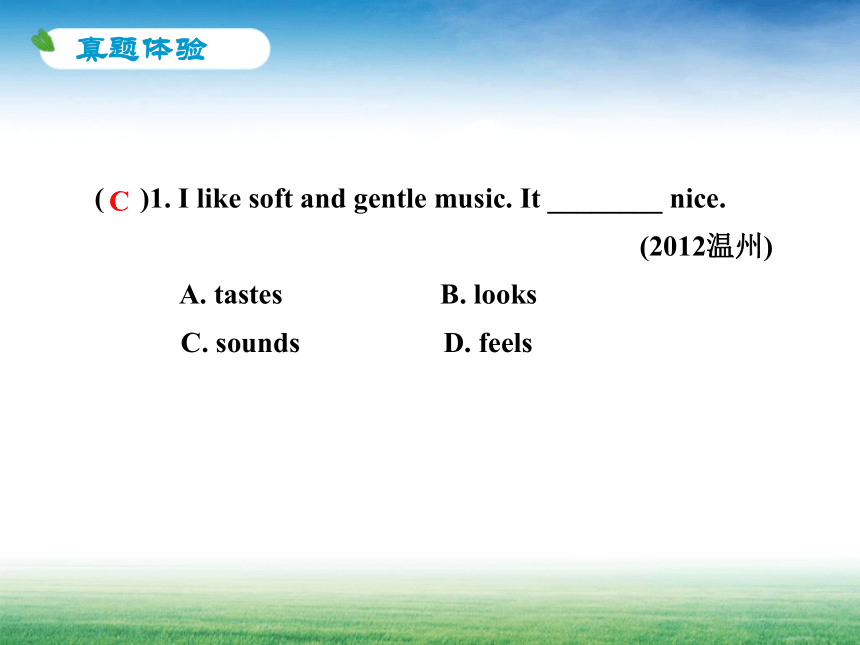
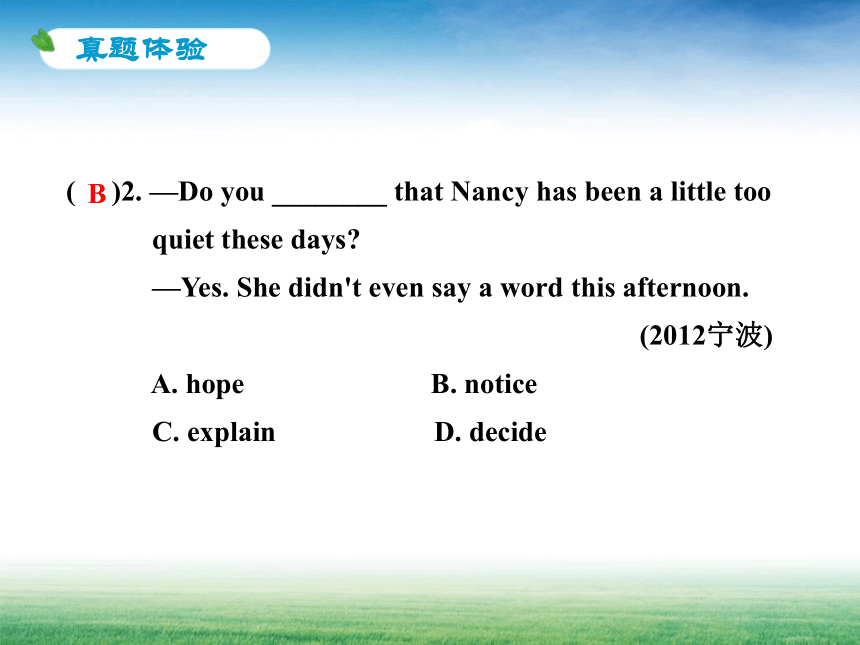
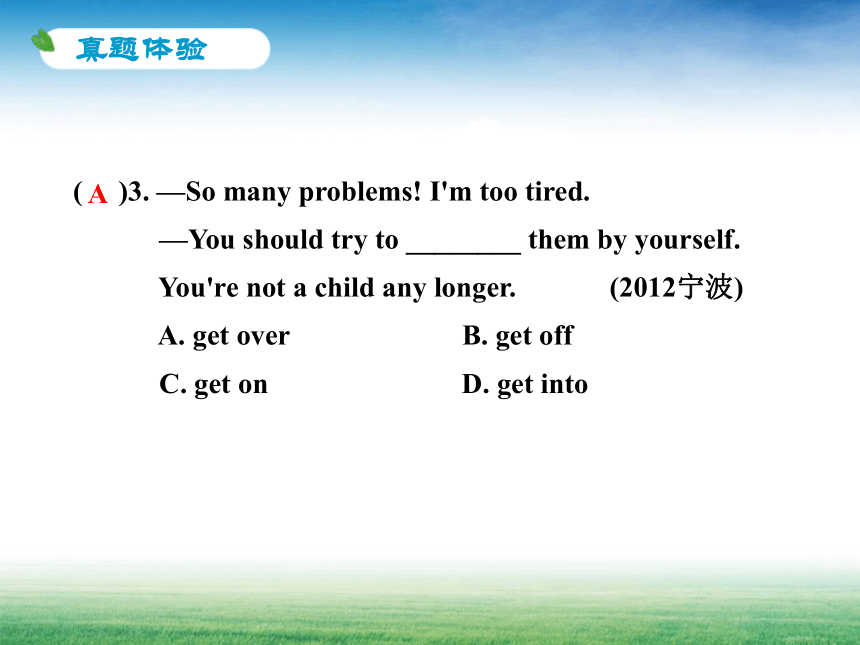
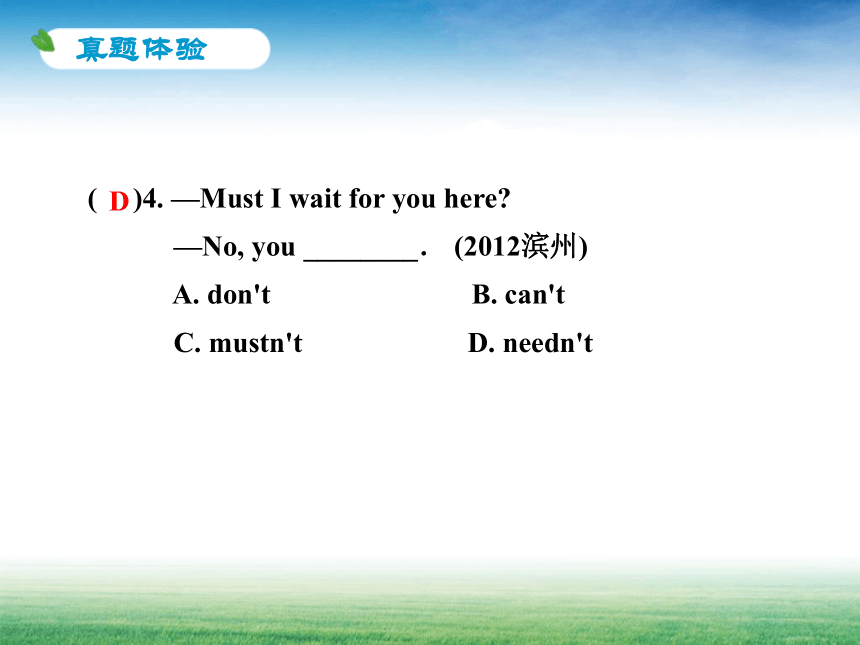
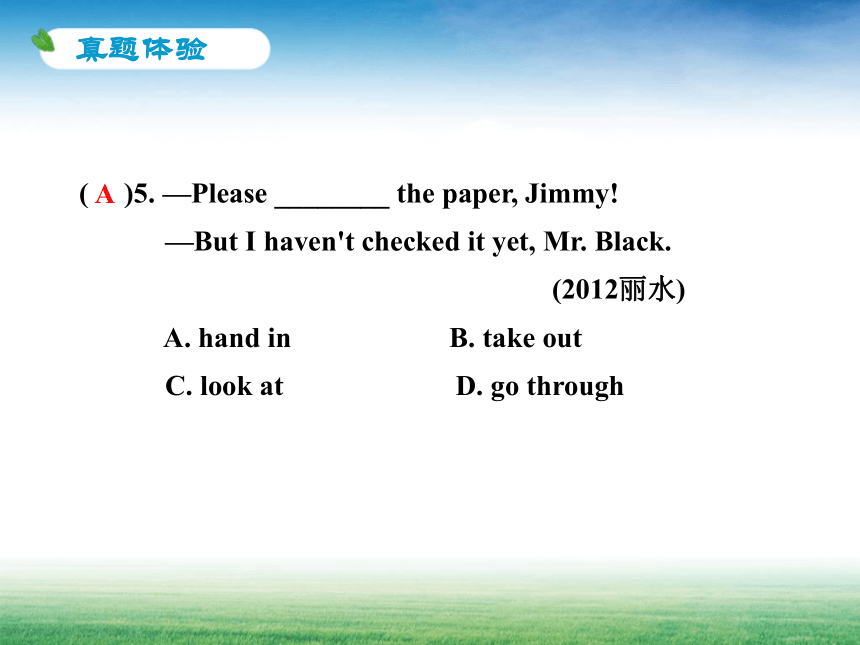
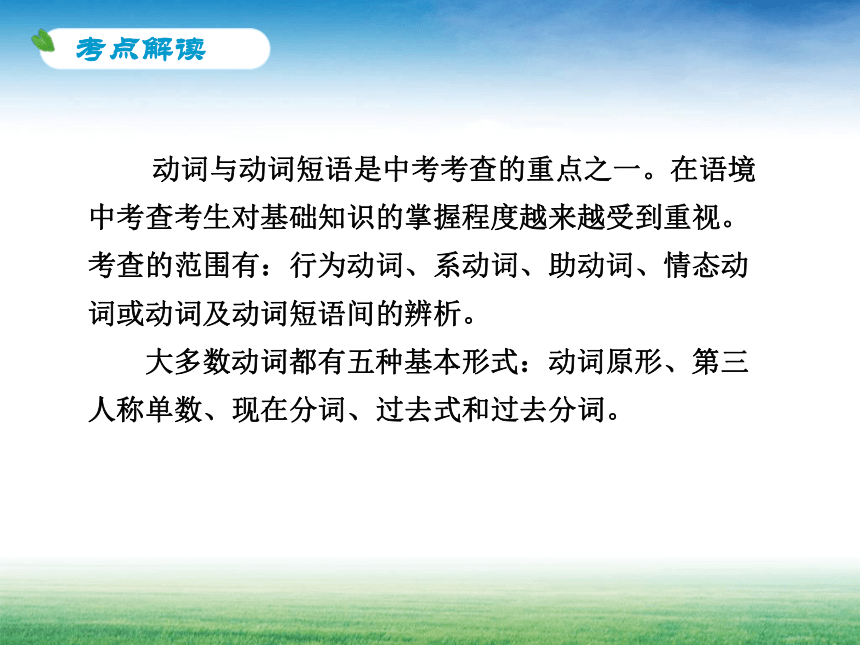
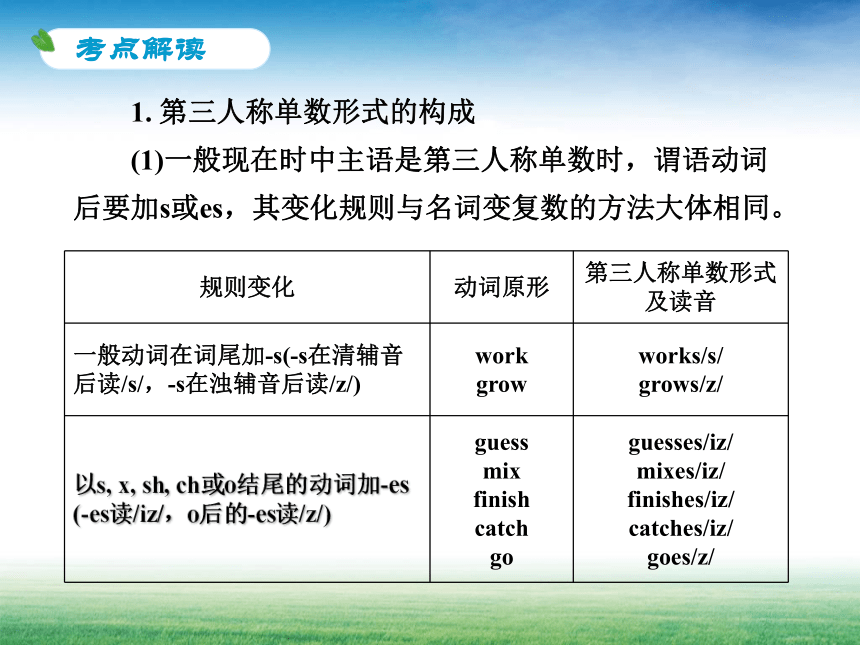
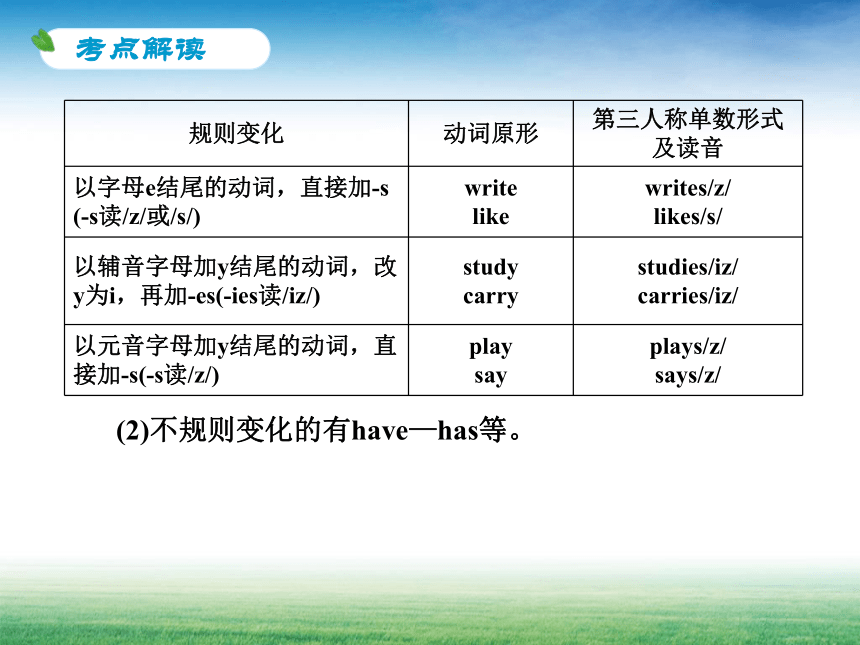
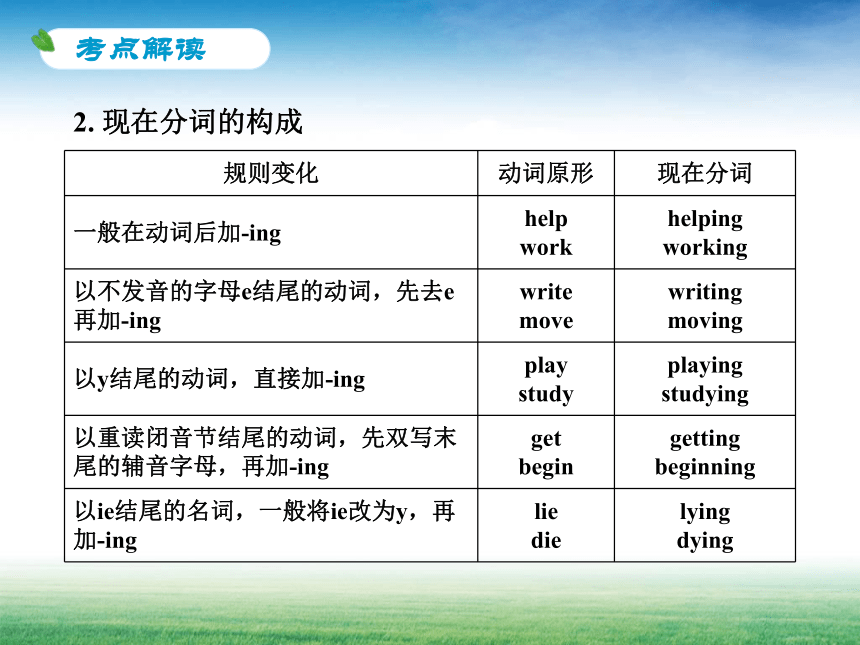
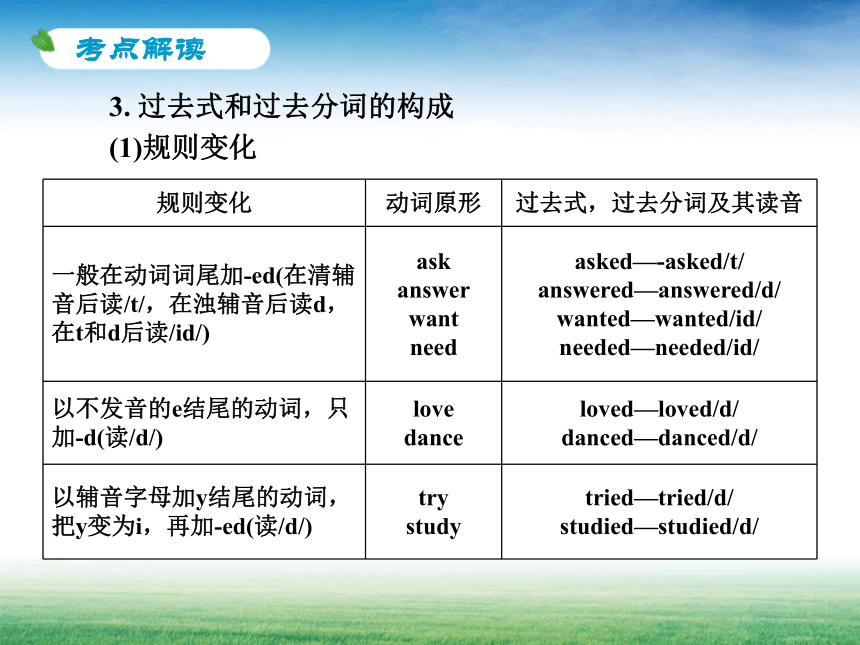
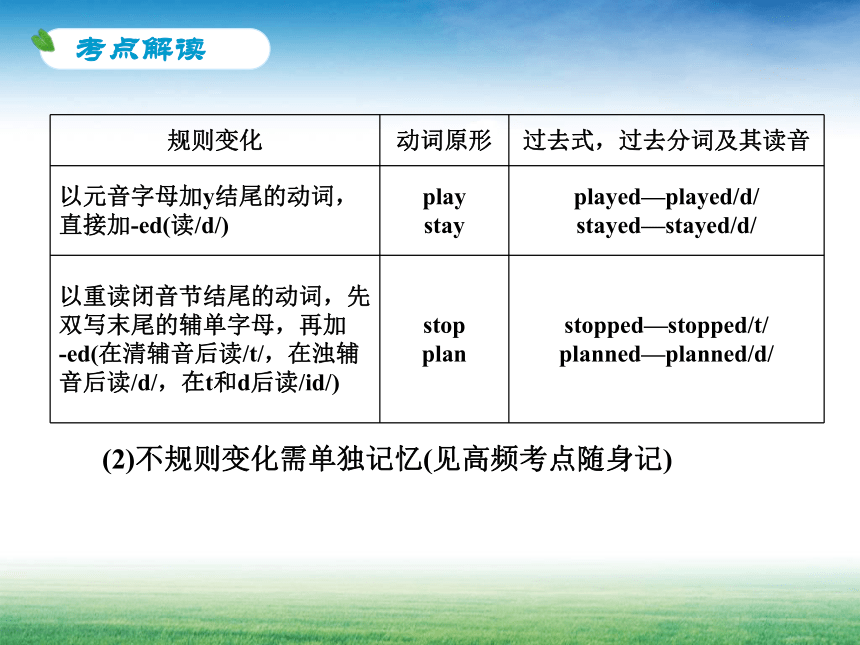
文档简介
课件66张PPT。第28课 动词的概述真题体验( )1. I like soft and gentle music. It ________ nice.
(2012温州)
A. tastes B. looks
C. sounds D. feels C真题体验( )2. —Do you ________ that Nancy has been a little too
quiet these days?
—Yes. She didn't even say a word this afternoon.
(2012宁波)
A. hope B. notice
C. explain D. decideB真题体验( )3. —So many problems! I'm too tired.
—You should try to ________ them by yourself.
You're not a child any longer. (2012宁波)
A. get over B. get off
C. get on D. get intoA真题体验( )4. —Must I wait for you here?
—No, you ________. (2012滨州)
A. don't B. can't
C. mustn't D. needn'tD真题体验( )5. —Please ________ the paper, Jimmy!
—But I haven't checked it yet, Mr. Black.
(2012丽水)
A. hand in B. take out
C. look at D. go throughA考点解读 动词与动词短语是中考考查的重点之一。在语境中考查考生对基础知识的掌握程度越来越受到重视。考查的范围有:行为动词、系动词、助动词、情态动词或动词及动词短语间的辨析。
大多数动词都有五种基本形式:动词原形、第三人称单数、现在分词、过去式和过去分词。
考点解读 1. 第三人称单数形式的构成
(1)一般现在时中主语是第三人称单数时,谓语动词后要加s或es,其变化规则与名词变复数的方法大体相同。考点解读(2)不规则变化的有have—has等。考点解读2. 现在分词的构成考点解读 3. 过去式和过去分词的构成
(1)规则变化考点解读 (2)不规则变化需单独记忆(见高频考点随身记)考向聚焦热点考向一 实义动词词义辨析 实义动词。能独立作谓语,根据后面是否带宾语,可分为及物动词和不及物动词。
1. 及物动词
及物动词后面要跟宾语才使能句子语意完整。如love, need, want等。它主要用于三种句型中:
(1)动词+宾语
如:I bought some books yesterday。我昨天买了一些书。(bought后有宾语books,为及物动词)
(2)动词+宾语+宾补
(3)动词+间接宾语+直接宾语考向聚焦 2. 不及物动词
(1)不及物动词本身有完整的意思,后不须接宾语。
如:He always studies hard. 他一直学习努力。 (study后无宾语,为不及物动词)
(2)若不及物动词需要带宾语,其后需加适当的介词,才可以跟宾语。
(3)有的动词既可作及物动词,也可用作不及物动词。
如:She sings very well. 她唱得很好。(sing是不及物动词)
She sang an English song just now. 她刚才唱了一首英文歌。(sing是及物动词)考向聚焦【例1】 —Why don't you buy the computer?
—It's too expensive. I can't ________ it. (2012襄阳)
A. afford B. sell
C. borrow D. keep
解析:由前文“太贵了”可知“买不起”。故“can't
afford买不起”符合题意。
A考向聚焦【例2】 The Internet is so closely connected with our
daily life. Can you ________ a life without it?
(2012河南)
A. understand B. imagine
C. consider D. expect
解析:句意:互联网与我们日常生活联系如此密切,你
能想象没有它的生活吗?故“imagine想象”符合题意。B考向聚焦【例3】 —Jim, can you ________ this word in Chinese?
—Yes, I can________ a little Chinese. (2012咸宁)
A. speak; say B. say; speak
C. tell; speak D. talk; say
解析:考查动词词义辨析。speak后接语言,say后接
讲话的内容,tell常用于短语tell sb.sth.中,talk
常用于短语talk with 或talk about 中;speak
Chinese=say... in Chinese。B考向聚焦【例4】 I ________ some of my free time playing
basketball for my school team. (2011天津)
A. spend B. cost
C. take D. pay
解析:考查动词词义辨析。都表示“花费”。spend以
人做主语,后与on或(in) doing搭配;cost以物做主
语;it takes sb. some time to do sth. 为固定句
式;pay以人做主语,常与for搭配。A考向聚焦热点考向二 系动词和助动词的用法 1. 系动词。
本身有词义,但不能独立作谓语,须与表语一起构成谓语。用来表示主语状态的系动词只有be(am, is, are, was, were);用来表示主语继续或保持一种状态或态度的系动词有keep, stay, remain, stand等;表象系动词有look, seem, appear等;表示人的感觉的系动词有feel, smell, sound, taste;表变化的系动词有become, get, grow, turn等。考向聚焦 2. 助动词。
本身无意义或意义不完整,不能独立用作谓语。它须与别的动词连用,帮助构成各种时态、语态、否定句和疑问句等。常用助动词有be, have, has, do, does, did, will和shall等。考向聚焦【例5】 The cloth ________ very soft and comfortable.
(2012天津)
A. smells B. tastes
C. feels D. sounds
解析:与布料相关的系动词应用“feel摸起来”。C考向聚焦【例6】 —Do you like watching TV?
—No, but my brother ________.
A. does B. do
C. is D. likes
解析:通常我们用助动词替代上文提到的动词,
以免重复。my brother为第三人称,故“does”符
合题意。A考向聚焦【例7】 —Why do you keep the windows open on
such a cold day?
—There are so many students here, so we want to
keep the air nice and ________.
A. cold B. dry
C. cool D. clean
解析:句意:这么冷的天气你为什么敞着窗户?
这里有许多学生,所以我想让空气干净。D考向聚焦热点考向三 情态动词的用法 情态动词有一定的词义,但不能独立作谓语,须与动词原形一起构成谓语,表示说话人的情绪、态度和语气。情态动词没有人称和数的变化。
1. can(could)
(1)表能力,could表过去的能力。can与be able to 的基本意义相同。但can只有一般现在时和一般过去时,而be able to能用于各种时态。
(2)表可能性。
(3)表许可。口语中可代替may。
(4)can't 表有把握的否定判断,意为“不可能”。
could在口语中,常代替can来向对方比较委婉客气地提出请求或表示看法。此时could不表示过去时。考向聚焦 2. may(might)
(1)用来征求对方意见,意为“可以”。口语性较强。might可以指过去时间;也可指现在时间,语气更委婉。
(2)表猜测和对可能性的判断,意为“可能;也许”。might可以指过去时间;也可指现在时间,语气更加不肯定。
3. must
(1)表说话人的主观意志,意为“必须,应该”。无时态变化。其否定答语常用needn't或don't have to, 意为“不必”。
注:have to意为“不得不;必须”,主要强调受到外界客观因素的迫使。它可用于多种时态,且有人称和数的变化。
must 本身的否定形式mustn't意为“不许;一定不要”,表示禁止和告诫。考向聚焦
(2)表示对事物的推测,意为“想必;一定”,只用于肯定句。且比may的语气要肯定的多。
4. would
作情态动词时,无人称限制,表意愿,常与like, love连用。
5. should
(1)表义务。意为“应该”(某件事宜于做),用于各种人称。
(2)表推测,意为“想必一定、照说应该、估计”等。考向聚焦【例8】 —________ I do the laundry first?
—No, you ________. You can do your homework
first. (2012黄冈)
A. Must; mustn't B. Can; mustn't
C. Must; needn't D. May; needn't
解析:句意:我必须先洗衣服吗?不,没必要,你可
以先做作业。以must开头的一般疑问句的否定回答用
needn't。C考向聚焦【例9】 Tom, you ________ play with the knife.
You________ hurt yourself. (2012咸宁)
A. won't; can't B. mustn't; may
C. shouldn't; must D. can't; should
解析:句意:你不应该玩小刀,你可能伤到自己。B考向聚焦【例10】 —Whose shoes are these?
—They ________ be Mike's. They are much too large
for him. (2012宜宾)
A. might B. may
C. mustn't D. can't
解析:由下文“它们对他来说太大”可知“它们不可能
是Mike的”。can't表否定推测。D考向聚焦【例11】 ________ you dance? We need some more
actors for the talent show. (2012枣庄)
A. Need B. Shall
C. Must D. Can
解析:句意:你会跳舞吗?我们需要更多的演员参加
天才表演。故“can表能力”符合题意。D考向聚焦热点考向四 动词短语 动词短语指动词跟一个或两个介词或副词构成的固定词组。其意义上与原来动词不同。
1. 动词短语的分类:
(1)动词+介词
arrive in(at), ask for, begin with, be from, come from, get to, laugh at, look for, send for, wait for
(2)及物动词+副词
find out, give up, look up(查找), put on, pick up, ring up, take off(脱下), take away, turn on, turn off, think over考向聚焦 (3)不及物动词+副词
get up, go on, grow up, set off, stand up, take off(起飞)
(4)动词+副词+介词
get on(along) with, catch up with, come up with, go on with, look forward to
(5)动词+名词+介词
take part in, make friends with, take care of
(6)be+形容词+介词
be good at, be interested in, be good for, be worried about考向聚焦 2. 常用动词归纳:
(1)look短语
look for寻找;look after照顾;look over查看;look forward to渴望,向往;look at看着。
look up抬头看,在……查找;look into调查;look out当心;look out of从……往外看。
look like看起来像;look the same看起来一样;look through透过……看;浏览。
(2)put短语
put off推迟;put on穿上,上演;put away把……暂时收起来。
put out扑灭;put down写下; put back 放回;put up举起,建造,张贴。考向聚焦 (3)turn短语
turn on打开;turn off关掉;turn up把音量开大一点;turn down把音量开小一点。
turn to朝向;turn into变成;turn over翻开,翻转;turn...into...把……变成……。
(4)get短语
get on/along(well) with与某人相处(融洽);get up起床;get on上车(船、飞机、马); get off下车(船、飞机、马); get back回去;get back to回到;get away离开,逃脱。
get down下来;get home到家;get into进入,陷入;get out(of)(从……)出去;get to到达;get together聚会。考向聚焦 (5)take短语
take off(飞机)起飞,脱掉(衣服);take in吸收,上当;take away拿走;take out取出。
take on雇佣,呈现;take down取下;take up占据时间、空间,开始从事,拿起。
(6)agree短语
agree with同意某人的(意见、想法、分析、解释);agree to同意(计划、办法)。
agree to do sth.同意做某事。考向聚焦 (7)go短语
go over温习,复习;go swimming/skating/shopping/ dancing/fishing/hunting/camping去游泳/溜冰/购物/跳舞/钓鱼/打猎/野营。
go into走进;go out出去,熄灭;go away走开;go back回去,回顾;go up上升,攀登。
go by时间流逝,从旁经过;go down下降,下沉;go for为……而去; go on继续; go through经历;go to school去上学;go home 回家;go to the doctor去看医生。考向聚焦 (8)come短语
come along一道来;come in进来;come into进入;come out出来,出版;come down下来;come from来自;come back回来;come across偶然遇到;come over过来;come home回家; come into use开始使用; come on 快!得啦;跟着来;加油。
(9)give短语
give up放弃;give off放出、发出(气体、气味、烟雾、光、水、热等);give out精疲力竭、累倒,耗尽、用完;give away泄露,赠送;give in屈服,让步,投降。考向聚焦 (10)make短语
make a decision作出决定;make sb. do sth.让某人做某事;make a mistake犯错误;make progress取得进步; make friends with与……交朋友; make up编造,虚构,打扮,构成,组成;make a face做鬼脸。
(11)be短语
be friendly/kind to对……友好; be different from与……不同;be afraid of害怕;be popular with受……欢迎; be interested in对……感兴趣;be strict with对某人严格;be strict in 对某事严格;be famous/known as作为……有名;be famous/known for因……著名;be surprised at对……惊讶;be pleased with对……满意;be proud of对……感到自豪;考向聚焦be polite/impolite to对某人有礼貌/不礼貌;
be thankful/grateful to对某人感激; be good for 对……有好处;be good at擅长于;be made up of由……构成;be angry with对某人生气;be busy with忙于; be full of/filled with装满了;be late for……迟到;be covered with覆盖着。
(12)call短语
call at拜访,后接地点;call on拜访,后接被拜访的对象,号召;call back回电话; call up打电话,使回忆起;call for叫某人同往某处。考向聚焦【例12】 Cao Wenxuan's new book has just ________.
Let's go and buy one. (2012盐城)
A. come over B. come down
C. come on D. come out
解析:新书出版。故“come out出版”符合题意。D考向聚焦【例13】 —Never ________ today's work till tomorrow.
—Yes. It's a good habit. (2012日照)
A. put off B. put on
C. put up D. put down
解析:句意:不要把今天的工作推迟到明天。是的,
这是个好习惯。故“put off推迟”符合题意。A考向聚焦【例14】 Can you go and find out when the plane to New
York ________? (2012包头)
A. puts off B. gets off
C. takes off D. breaks off
解析:句意:你能去帮我查一下去伦敦的飞机何时起
飞吗?故“take off起飞”符合题意。C考向聚焦【例15】 —I missed the early bus and I had to ________
the next one on such a cold morning.
—Bad luck! (2012吉林)
A. wait for B. look up
C. care for D. put up
解析:由前文“错过早班车”可知“我不得不等下一班
车”。故“wait for等候”符合题意。A考向聚焦【例16】 ________, you guys! You don't want to miss
the train, do you? (2011丽水)
A. Look up B. Give up
C. Hurry up D. Grow up
解析:根据下文:你不想错过火车。判断此空应填入
hurry up(快点)。C考向聚焦Ⅰ. 词汇运用
The music is sweet, she often _______(分享)it with me.
(2012铜仁)
2. Now parents are _________(花费)more and more money
on their children's education. (2012恩施)
3. —When did you b_____ to study English?
—Seven years ago. (2012杭州)
4. He said he would never f______ the trip to Mount Fanjin.
(2012铜仁)
5. Newton was sitting under an apple tree when an apple f____ onto his head. (2012宁波)enjoysspendingeginorgetell考向聚焦6. No one can________ (success) without any hard work.
(2012恩施)
7. To improve your writing skills, you'd better _________
(development) a habit of reading. (2012上海)
8. You'd better ____ (eat) less food before you go to bed.
(2012滨洲)
9. Our notebook computer _______ (weigh) 5 pounds and
costs about £2,000. (2011扬州)
10. Yesterday I _______ (buy) a new dress at the Mary's for
my mum. (2011扬州)succeeddevelopweighseatbought领悟语法Ⅱ. 单项选择
( )1. —Do you know Tom?
—Sure. We had ________ in the same village for
many years. (2012衢州)
A. left B. lived
C. come D. gone
解析:考查动词词义辨析。句意:你认识Tom吗?当然,我们住在同一村里很多年了。故“lived居住”符合题意。B领悟语法( )2. ________ your names on the paper and you can
get a magazine. (2012河北)
A. Cut down B. Look down
C. Turn down D. Put down
解析:考查动词短语辨析。句意:在纸上写下你的名字,你可以得到一本杂志。故“put down写下”符合题意。D领悟语法( )3. We should learn how to ________ well with people
around us. (2012黄石)
A. get along B. get down
C. get to D. get up
解析:考查动词短语辨析。句意:我们应该学会如何与我们周围的人相处。故“get along well with与……相处好”符合题意。A领悟语法( )4. —Come on, let's ________!
—I just want to take it easy. My feet are killing
me. (2012绍兴)
A. study B. chat
C. dance D. listen
解析:考查动词词义辨析。由关键词“feet”可知“dance跳舞”符合题意。C领悟语法( )5. —It's the museum! So you ________ know
smoking is not allowed here.
—Oh, sorry. (2012绍兴)
A. must B. will
C. can D. may
解析:考查情态动词。句意:这是博物馆。因此你应该知道在这儿吸烟是不被允许的。故“must应该”符合题意。A领悟语法( )6. —I'm afraid I need a pair of glasses. I ________
hardly see the words on the blackboard.
—That's terrible. You may have got poor eyesight.
(2012镇江)
A. can B. must
C. may D. need
解析:考查情态动词。由上文“需要一副眼镜”可知“我几乎不能看见黑板上的字”。故“can能”符合题意。A领悟语法( )7. Don't ________ the bus until it stops. (2012聊城)
A. turn off B. put on
C. get off D. set up
解析:考查动词短语辨析。句意:直到车停才能下车。故“get off下车”符合题意。C领悟语法( )8. I'm not sure when the plane will ________ and
when it will land. (2012绵阳)
A. take off B. run off
C. open up D. stay up
解析:考查动词短语辨析。与下文“land着陆”相对应的是“take off起飞”。A领悟语法( )9. The workers in the Huashan mountains have to
________ rubbish to keep the mountains clean.
(2012陕西)
A. turn up B. pick up
C. mix up D. give up
解析:考查动词短语辨析。与“rubbish垃圾”相对应的是“pick up捡起来”。 B领悟语法( )10. —Must I clean the classroom now, Miss Green?
—No, you ________. You can do it after school.
(2012来宾)
A. can't B. mustn't
C. needn't D. shouldn't
解析:考查情态动词。“Must...?”的否定回答用“needn't”。C领悟语法( )11. Smoking is not allowed in public places since
May 1st. It may be a good chance for some
people to ________ smoking. (2011嘉兴、舟山)
A. put up B. give up
C. pick up D. look up
解析:考查动词短语辨析。根据上文“从5月1日开始,公共场合不允许吸烟”可知此处与戒烟有关。故“give up smoking戒烟”符合题意。B领悟语法( )12. When you don't know a word, you can ________ in
the dictionary. (2011宁波)
A. look it up B. set it up
C. give it up D. pick it up
解析:考查动词短语词义辨析。look up查阅(书本);set up建立;give up放弃;pick up捡起。它们都是动副短语,代词放在中间。句意:当你不认识一个词的时候,你可以查阅字典。故选A。A领悟语法( )13. Would you please ________ my baby brother while
I'm cooking? (2011河北)
A. take out of B. take care of
C. take part in D. take away from
解析:考查动词短语辨析。由题意“我做饭的时候请你照顾下我的弟弟好吗”可知应用“take care of照顾;照看”。take out of 带出去;take part in 参加;take away from从……带走,均不符合题意。B领悟语法( )14. I won't go to the concert this evening, I ________
watch the NBA on TV. It's more exciting.
(2011扬州)
A. had better B. would rather
C. ought to D. have to
解析:考查动词短语辨析。had better最好;would rather更喜欢,更愿意;ought to应该; have to必须。句意:我今晚更愿意看NBA,音乐会就不去了。故选B。B领悟语法( )15. —Whose T-shirt is this?
—It ________ be John's. It's ________ small for
him. (2011黄岗)
A. can't; much too B. can't; too much
C. mustn't; much too D. mustn't; too much
解析:考查情态动词。句意:它不可能是约翰的,对他来说太小了。too much太多,much too太……。故选A。A领悟语法( )16. Jack ________ dislike the weather in Beijing in
spring, because there is so much wind and sand.
But now he ________ it. (2012咸宁)
A. is used to; used to
B. used to; is used to
C. was used to; is used to
D. used to; uses to
解析:is used to sth./doing sth.习惯于;used to do sth.过去常常做某事。故选B。B领悟语法( )17. —How long may I ________ your bike?
—For a week. But you mustn't ________ it to
others. (2011金华)
A. borrow; lend B. keep; lend
C. lend; borrow D. keep; borrow
解析:考查动词词义辨析。borrow意为“借入”;lend意为“借出”;“借多长时间”用keep,为延续性动词,常与how long和延续性动词连用。故选B。B领悟语法Ⅲ. 用所给动词的正确形式填空
1. Mr. Zhang _______ (teach) us English three years ago.
2. Peter turned off the computer after he finished ________
(write) an e-mail.
3. —Where's Miss Wang?
—Look, she __________ (talk) with the students.
4. Mr. Liu isn't here now. He _________ (go) to Beijing.
5. The children will go to the zoo if it ___________ (not rain)
this Saturday.
6. There _______ (be) a meeting in our school tomorrow
afternoon.taughtwritingis talkinghas gonedoesn’t rainwill be领悟语法7. Mr. Green ______________ (watch) TV at this time last
night.
8. You'd better ____ (eat) less food before you go to bed.
9. My teacher told me that light _______ (travel) much
faster than sound.
10. English _________ (speak) by many people in the world.was watchingeattravelsis spoken完成考点跟踪训练 28
(2012温州)
A. tastes B. looks
C. sounds D. feels C真题体验( )2. —Do you ________ that Nancy has been a little too
quiet these days?
—Yes. She didn't even say a word this afternoon.
(2012宁波)
A. hope B. notice
C. explain D. decideB真题体验( )3. —So many problems! I'm too tired.
—You should try to ________ them by yourself.
You're not a child any longer. (2012宁波)
A. get over B. get off
C. get on D. get intoA真题体验( )4. —Must I wait for you here?
—No, you ________. (2012滨州)
A. don't B. can't
C. mustn't D. needn'tD真题体验( )5. —Please ________ the paper, Jimmy!
—But I haven't checked it yet, Mr. Black.
(2012丽水)
A. hand in B. take out
C. look at D. go throughA考点解读 动词与动词短语是中考考查的重点之一。在语境中考查考生对基础知识的掌握程度越来越受到重视。考查的范围有:行为动词、系动词、助动词、情态动词或动词及动词短语间的辨析。
大多数动词都有五种基本形式:动词原形、第三人称单数、现在分词、过去式和过去分词。
考点解读 1. 第三人称单数形式的构成
(1)一般现在时中主语是第三人称单数时,谓语动词后要加s或es,其变化规则与名词变复数的方法大体相同。考点解读(2)不规则变化的有have—has等。考点解读2. 现在分词的构成考点解读 3. 过去式和过去分词的构成
(1)规则变化考点解读 (2)不规则变化需单独记忆(见高频考点随身记)考向聚焦热点考向一 实义动词词义辨析 实义动词。能独立作谓语,根据后面是否带宾语,可分为及物动词和不及物动词。
1. 及物动词
及物动词后面要跟宾语才使能句子语意完整。如love, need, want等。它主要用于三种句型中:
(1)动词+宾语
如:I bought some books yesterday。我昨天买了一些书。(bought后有宾语books,为及物动词)
(2)动词+宾语+宾补
(3)动词+间接宾语+直接宾语考向聚焦 2. 不及物动词
(1)不及物动词本身有完整的意思,后不须接宾语。
如:He always studies hard. 他一直学习努力。 (study后无宾语,为不及物动词)
(2)若不及物动词需要带宾语,其后需加适当的介词,才可以跟宾语。
(3)有的动词既可作及物动词,也可用作不及物动词。
如:She sings very well. 她唱得很好。(sing是不及物动词)
She sang an English song just now. 她刚才唱了一首英文歌。(sing是及物动词)考向聚焦【例1】 —Why don't you buy the computer?
—It's too expensive. I can't ________ it. (2012襄阳)
A. afford B. sell
C. borrow D. keep
解析:由前文“太贵了”可知“买不起”。故“can't
afford买不起”符合题意。
A考向聚焦【例2】 The Internet is so closely connected with our
daily life. Can you ________ a life without it?
(2012河南)
A. understand B. imagine
C. consider D. expect
解析:句意:互联网与我们日常生活联系如此密切,你
能想象没有它的生活吗?故“imagine想象”符合题意。B考向聚焦【例3】 —Jim, can you ________ this word in Chinese?
—Yes, I can________ a little Chinese. (2012咸宁)
A. speak; say B. say; speak
C. tell; speak D. talk; say
解析:考查动词词义辨析。speak后接语言,say后接
讲话的内容,tell常用于短语tell sb.sth.中,talk
常用于短语talk with 或talk about 中;speak
Chinese=say... in Chinese。B考向聚焦【例4】 I ________ some of my free time playing
basketball for my school team. (2011天津)
A. spend B. cost
C. take D. pay
解析:考查动词词义辨析。都表示“花费”。spend以
人做主语,后与on或(in) doing搭配;cost以物做主
语;it takes sb. some time to do sth. 为固定句
式;pay以人做主语,常与for搭配。A考向聚焦热点考向二 系动词和助动词的用法 1. 系动词。
本身有词义,但不能独立作谓语,须与表语一起构成谓语。用来表示主语状态的系动词只有be(am, is, are, was, were);用来表示主语继续或保持一种状态或态度的系动词有keep, stay, remain, stand等;表象系动词有look, seem, appear等;表示人的感觉的系动词有feel, smell, sound, taste;表变化的系动词有become, get, grow, turn等。考向聚焦 2. 助动词。
本身无意义或意义不完整,不能独立用作谓语。它须与别的动词连用,帮助构成各种时态、语态、否定句和疑问句等。常用助动词有be, have, has, do, does, did, will和shall等。考向聚焦【例5】 The cloth ________ very soft and comfortable.
(2012天津)
A. smells B. tastes
C. feels D. sounds
解析:与布料相关的系动词应用“feel摸起来”。C考向聚焦【例6】 —Do you like watching TV?
—No, but my brother ________.
A. does B. do
C. is D. likes
解析:通常我们用助动词替代上文提到的动词,
以免重复。my brother为第三人称,故“does”符
合题意。A考向聚焦【例7】 —Why do you keep the windows open on
such a cold day?
—There are so many students here, so we want to
keep the air nice and ________.
A. cold B. dry
C. cool D. clean
解析:句意:这么冷的天气你为什么敞着窗户?
这里有许多学生,所以我想让空气干净。D考向聚焦热点考向三 情态动词的用法 情态动词有一定的词义,但不能独立作谓语,须与动词原形一起构成谓语,表示说话人的情绪、态度和语气。情态动词没有人称和数的变化。
1. can(could)
(1)表能力,could表过去的能力。can与be able to 的基本意义相同。但can只有一般现在时和一般过去时,而be able to能用于各种时态。
(2)表可能性。
(3)表许可。口语中可代替may。
(4)can't 表有把握的否定判断,意为“不可能”。
could在口语中,常代替can来向对方比较委婉客气地提出请求或表示看法。此时could不表示过去时。考向聚焦 2. may(might)
(1)用来征求对方意见,意为“可以”。口语性较强。might可以指过去时间;也可指现在时间,语气更委婉。
(2)表猜测和对可能性的判断,意为“可能;也许”。might可以指过去时间;也可指现在时间,语气更加不肯定。
3. must
(1)表说话人的主观意志,意为“必须,应该”。无时态变化。其否定答语常用needn't或don't have to, 意为“不必”。
注:have to意为“不得不;必须”,主要强调受到外界客观因素的迫使。它可用于多种时态,且有人称和数的变化。
must 本身的否定形式mustn't意为“不许;一定不要”,表示禁止和告诫。考向聚焦
(2)表示对事物的推测,意为“想必;一定”,只用于肯定句。且比may的语气要肯定的多。
4. would
作情态动词时,无人称限制,表意愿,常与like, love连用。
5. should
(1)表义务。意为“应该”(某件事宜于做),用于各种人称。
(2)表推测,意为“想必一定、照说应该、估计”等。考向聚焦【例8】 —________ I do the laundry first?
—No, you ________. You can do your homework
first. (2012黄冈)
A. Must; mustn't B. Can; mustn't
C. Must; needn't D. May; needn't
解析:句意:我必须先洗衣服吗?不,没必要,你可
以先做作业。以must开头的一般疑问句的否定回答用
needn't。C考向聚焦【例9】 Tom, you ________ play with the knife.
You________ hurt yourself. (2012咸宁)
A. won't; can't B. mustn't; may
C. shouldn't; must D. can't; should
解析:句意:你不应该玩小刀,你可能伤到自己。B考向聚焦【例10】 —Whose shoes are these?
—They ________ be Mike's. They are much too large
for him. (2012宜宾)
A. might B. may
C. mustn't D. can't
解析:由下文“它们对他来说太大”可知“它们不可能
是Mike的”。can't表否定推测。D考向聚焦【例11】 ________ you dance? We need some more
actors for the talent show. (2012枣庄)
A. Need B. Shall
C. Must D. Can
解析:句意:你会跳舞吗?我们需要更多的演员参加
天才表演。故“can表能力”符合题意。D考向聚焦热点考向四 动词短语 动词短语指动词跟一个或两个介词或副词构成的固定词组。其意义上与原来动词不同。
1. 动词短语的分类:
(1)动词+介词
arrive in(at), ask for, begin with, be from, come from, get to, laugh at, look for, send for, wait for
(2)及物动词+副词
find out, give up, look up(查找), put on, pick up, ring up, take off(脱下), take away, turn on, turn off, think over考向聚焦 (3)不及物动词+副词
get up, go on, grow up, set off, stand up, take off(起飞)
(4)动词+副词+介词
get on(along) with, catch up with, come up with, go on with, look forward to
(5)动词+名词+介词
take part in, make friends with, take care of
(6)be+形容词+介词
be good at, be interested in, be good for, be worried about考向聚焦 2. 常用动词归纳:
(1)look短语
look for寻找;look after照顾;look over查看;look forward to渴望,向往;look at看着。
look up抬头看,在……查找;look into调查;look out当心;look out of从……往外看。
look like看起来像;look the same看起来一样;look through透过……看;浏览。
(2)put短语
put off推迟;put on穿上,上演;put away把……暂时收起来。
put out扑灭;put down写下; put back 放回;put up举起,建造,张贴。考向聚焦 (3)turn短语
turn on打开;turn off关掉;turn up把音量开大一点;turn down把音量开小一点。
turn to朝向;turn into变成;turn over翻开,翻转;turn...into...把……变成……。
(4)get短语
get on/along(well) with与某人相处(融洽);get up起床;get on上车(船、飞机、马); get off下车(船、飞机、马); get back回去;get back to回到;get away离开,逃脱。
get down下来;get home到家;get into进入,陷入;get out(of)(从……)出去;get to到达;get together聚会。考向聚焦 (5)take短语
take off(飞机)起飞,脱掉(衣服);take in吸收,上当;take away拿走;take out取出。
take on雇佣,呈现;take down取下;take up占据时间、空间,开始从事,拿起。
(6)agree短语
agree with同意某人的(意见、想法、分析、解释);agree to同意(计划、办法)。
agree to do sth.同意做某事。考向聚焦 (7)go短语
go over温习,复习;go swimming/skating/shopping/ dancing/fishing/hunting/camping去游泳/溜冰/购物/跳舞/钓鱼/打猎/野营。
go into走进;go out出去,熄灭;go away走开;go back回去,回顾;go up上升,攀登。
go by时间流逝,从旁经过;go down下降,下沉;go for为……而去; go on继续; go through经历;go to school去上学;go home 回家;go to the doctor去看医生。考向聚焦 (8)come短语
come along一道来;come in进来;come into进入;come out出来,出版;come down下来;come from来自;come back回来;come across偶然遇到;come over过来;come home回家; come into use开始使用; come on 快!得啦;跟着来;加油。
(9)give短语
give up放弃;give off放出、发出(气体、气味、烟雾、光、水、热等);give out精疲力竭、累倒,耗尽、用完;give away泄露,赠送;give in屈服,让步,投降。考向聚焦 (10)make短语
make a decision作出决定;make sb. do sth.让某人做某事;make a mistake犯错误;make progress取得进步; make friends with与……交朋友; make up编造,虚构,打扮,构成,组成;make a face做鬼脸。
(11)be短语
be friendly/kind to对……友好; be different from与……不同;be afraid of害怕;be popular with受……欢迎; be interested in对……感兴趣;be strict with对某人严格;be strict in 对某事严格;be famous/known as作为……有名;be famous/known for因……著名;be surprised at对……惊讶;be pleased with对……满意;be proud of对……感到自豪;考向聚焦be polite/impolite to对某人有礼貌/不礼貌;
be thankful/grateful to对某人感激; be good for 对……有好处;be good at擅长于;be made up of由……构成;be angry with对某人生气;be busy with忙于; be full of/filled with装满了;be late for……迟到;be covered with覆盖着。
(12)call短语
call at拜访,后接地点;call on拜访,后接被拜访的对象,号召;call back回电话; call up打电话,使回忆起;call for叫某人同往某处。考向聚焦【例12】 Cao Wenxuan's new book has just ________.
Let's go and buy one. (2012盐城)
A. come over B. come down
C. come on D. come out
解析:新书出版。故“come out出版”符合题意。D考向聚焦【例13】 —Never ________ today's work till tomorrow.
—Yes. It's a good habit. (2012日照)
A. put off B. put on
C. put up D. put down
解析:句意:不要把今天的工作推迟到明天。是的,
这是个好习惯。故“put off推迟”符合题意。A考向聚焦【例14】 Can you go and find out when the plane to New
York ________? (2012包头)
A. puts off B. gets off
C. takes off D. breaks off
解析:句意:你能去帮我查一下去伦敦的飞机何时起
飞吗?故“take off起飞”符合题意。C考向聚焦【例15】 —I missed the early bus and I had to ________
the next one on such a cold morning.
—Bad luck! (2012吉林)
A. wait for B. look up
C. care for D. put up
解析:由前文“错过早班车”可知“我不得不等下一班
车”。故“wait for等候”符合题意。A考向聚焦【例16】 ________, you guys! You don't want to miss
the train, do you? (2011丽水)
A. Look up B. Give up
C. Hurry up D. Grow up
解析:根据下文:你不想错过火车。判断此空应填入
hurry up(快点)。C考向聚焦Ⅰ. 词汇运用
The music is sweet, she often _______(分享)it with me.
(2012铜仁)
2. Now parents are _________(花费)more and more money
on their children's education. (2012恩施)
3. —When did you b_____ to study English?
—Seven years ago. (2012杭州)
4. He said he would never f______ the trip to Mount Fanjin.
(2012铜仁)
5. Newton was sitting under an apple tree when an apple f____ onto his head. (2012宁波)enjoysspendingeginorgetell考向聚焦6. No one can________ (success) without any hard work.
(2012恩施)
7. To improve your writing skills, you'd better _________
(development) a habit of reading. (2012上海)
8. You'd better ____ (eat) less food before you go to bed.
(2012滨洲)
9. Our notebook computer _______ (weigh) 5 pounds and
costs about £2,000. (2011扬州)
10. Yesterday I _______ (buy) a new dress at the Mary's for
my mum. (2011扬州)succeeddevelopweighseatbought领悟语法Ⅱ. 单项选择
( )1. —Do you know Tom?
—Sure. We had ________ in the same village for
many years. (2012衢州)
A. left B. lived
C. come D. gone
解析:考查动词词义辨析。句意:你认识Tom吗?当然,我们住在同一村里很多年了。故“lived居住”符合题意。B领悟语法( )2. ________ your names on the paper and you can
get a magazine. (2012河北)
A. Cut down B. Look down
C. Turn down D. Put down
解析:考查动词短语辨析。句意:在纸上写下你的名字,你可以得到一本杂志。故“put down写下”符合题意。D领悟语法( )3. We should learn how to ________ well with people
around us. (2012黄石)
A. get along B. get down
C. get to D. get up
解析:考查动词短语辨析。句意:我们应该学会如何与我们周围的人相处。故“get along well with与……相处好”符合题意。A领悟语法( )4. —Come on, let's ________!
—I just want to take it easy. My feet are killing
me. (2012绍兴)
A. study B. chat
C. dance D. listen
解析:考查动词词义辨析。由关键词“feet”可知“dance跳舞”符合题意。C领悟语法( )5. —It's the museum! So you ________ know
smoking is not allowed here.
—Oh, sorry. (2012绍兴)
A. must B. will
C. can D. may
解析:考查情态动词。句意:这是博物馆。因此你应该知道在这儿吸烟是不被允许的。故“must应该”符合题意。A领悟语法( )6. —I'm afraid I need a pair of glasses. I ________
hardly see the words on the blackboard.
—That's terrible. You may have got poor eyesight.
(2012镇江)
A. can B. must
C. may D. need
解析:考查情态动词。由上文“需要一副眼镜”可知“我几乎不能看见黑板上的字”。故“can能”符合题意。A领悟语法( )7. Don't ________ the bus until it stops. (2012聊城)
A. turn off B. put on
C. get off D. set up
解析:考查动词短语辨析。句意:直到车停才能下车。故“get off下车”符合题意。C领悟语法( )8. I'm not sure when the plane will ________ and
when it will land. (2012绵阳)
A. take off B. run off
C. open up D. stay up
解析:考查动词短语辨析。与下文“land着陆”相对应的是“take off起飞”。A领悟语法( )9. The workers in the Huashan mountains have to
________ rubbish to keep the mountains clean.
(2012陕西)
A. turn up B. pick up
C. mix up D. give up
解析:考查动词短语辨析。与“rubbish垃圾”相对应的是“pick up捡起来”。 B领悟语法( )10. —Must I clean the classroom now, Miss Green?
—No, you ________. You can do it after school.
(2012来宾)
A. can't B. mustn't
C. needn't D. shouldn't
解析:考查情态动词。“Must...?”的否定回答用“needn't”。C领悟语法( )11. Smoking is not allowed in public places since
May 1st. It may be a good chance for some
people to ________ smoking. (2011嘉兴、舟山)
A. put up B. give up
C. pick up D. look up
解析:考查动词短语辨析。根据上文“从5月1日开始,公共场合不允许吸烟”可知此处与戒烟有关。故“give up smoking戒烟”符合题意。B领悟语法( )12. When you don't know a word, you can ________ in
the dictionary. (2011宁波)
A. look it up B. set it up
C. give it up D. pick it up
解析:考查动词短语词义辨析。look up查阅(书本);set up建立;give up放弃;pick up捡起。它们都是动副短语,代词放在中间。句意:当你不认识一个词的时候,你可以查阅字典。故选A。A领悟语法( )13. Would you please ________ my baby brother while
I'm cooking? (2011河北)
A. take out of B. take care of
C. take part in D. take away from
解析:考查动词短语辨析。由题意“我做饭的时候请你照顾下我的弟弟好吗”可知应用“take care of照顾;照看”。take out of 带出去;take part in 参加;take away from从……带走,均不符合题意。B领悟语法( )14. I won't go to the concert this evening, I ________
watch the NBA on TV. It's more exciting.
(2011扬州)
A. had better B. would rather
C. ought to D. have to
解析:考查动词短语辨析。had better最好;would rather更喜欢,更愿意;ought to应该; have to必须。句意:我今晚更愿意看NBA,音乐会就不去了。故选B。B领悟语法( )15. —Whose T-shirt is this?
—It ________ be John's. It's ________ small for
him. (2011黄岗)
A. can't; much too B. can't; too much
C. mustn't; much too D. mustn't; too much
解析:考查情态动词。句意:它不可能是约翰的,对他来说太小了。too much太多,much too太……。故选A。A领悟语法( )16. Jack ________ dislike the weather in Beijing in
spring, because there is so much wind and sand.
But now he ________ it. (2012咸宁)
A. is used to; used to
B. used to; is used to
C. was used to; is used to
D. used to; uses to
解析:is used to sth./doing sth.习惯于;used to do sth.过去常常做某事。故选B。B领悟语法( )17. —How long may I ________ your bike?
—For a week. But you mustn't ________ it to
others. (2011金华)
A. borrow; lend B. keep; lend
C. lend; borrow D. keep; borrow
解析:考查动词词义辨析。borrow意为“借入”;lend意为“借出”;“借多长时间”用keep,为延续性动词,常与how long和延续性动词连用。故选B。B领悟语法Ⅲ. 用所给动词的正确形式填空
1. Mr. Zhang _______ (teach) us English three years ago.
2. Peter turned off the computer after he finished ________
(write) an e-mail.
3. —Where's Miss Wang?
—Look, she __________ (talk) with the students.
4. Mr. Liu isn't here now. He _________ (go) to Beijing.
5. The children will go to the zoo if it ___________ (not rain)
this Saturday.
6. There _______ (be) a meeting in our school tomorrow
afternoon.taughtwritingis talkinghas gonedoesn’t rainwill be领悟语法7. Mr. Green ______________ (watch) TV at this time last
night.
8. You'd better ____ (eat) less food before you go to bed.
9. My teacher told me that light _______ (travel) much
faster than sound.
10. English _________ (speak) by many people in the world.was watchingeattravelsis spoken完成考点跟踪训练 28
同课章节目录
- 词法
- 名词
- 动词和动词短语
- 动词语态
- 动词时态
- 助动词和情态动词
- 非谓语动词
- 冠词
- 代词
- 数词和量词
- 形容词副词及其比较等级
- 介词和介词短语
- 连词和感叹词
- 构词法
- 相似、相近词比较
- 句法
- 陈述句
- 一般疑问句和否定疑问句
- 特殊疑问句及选择疑问句
- 反意疑问句
- 存在句(There be句型)
- 宾语从句
- 定语从句
- 状语从句
- 主谓一致问题
- 简单句
- 并列句
- 复合句
- 主谓一致
- 主、表语从句
- 名词性从句
- 直接引语和间接引语
- 虚拟语气
- 感叹句
- 强调句
- 倒装句
- 祈使句
- 句子的成分
- 句子的分类
- 题型专区
- 单项选择部分
- 易错题
- 完形填空
- 阅读理解
- 词汇练习
- 听说训练
- 句型转换
- 补全对话
- 短文改错
- 翻译
- 书面表达
- 任务型阅读
- 语法填空
- 其他资料
